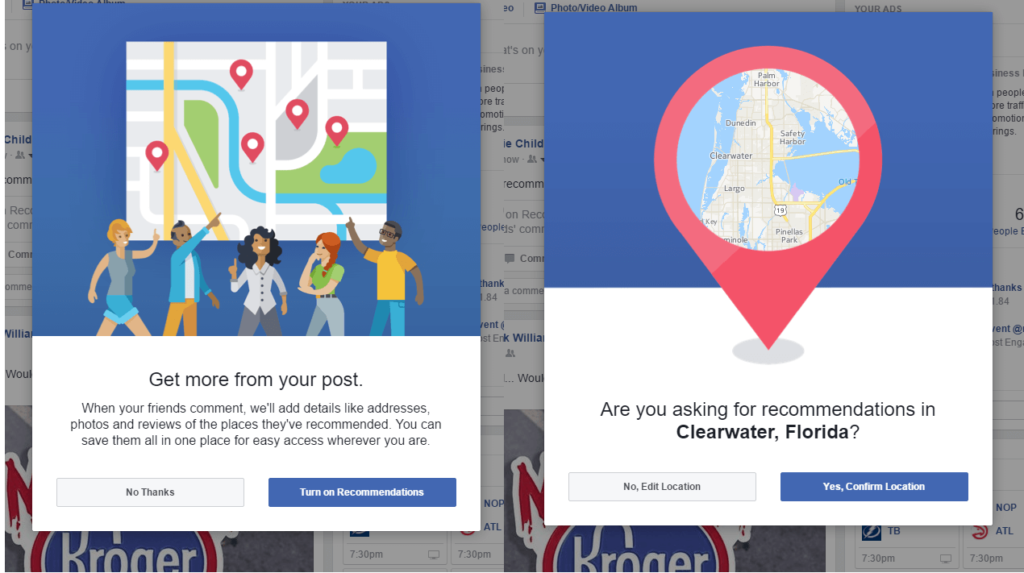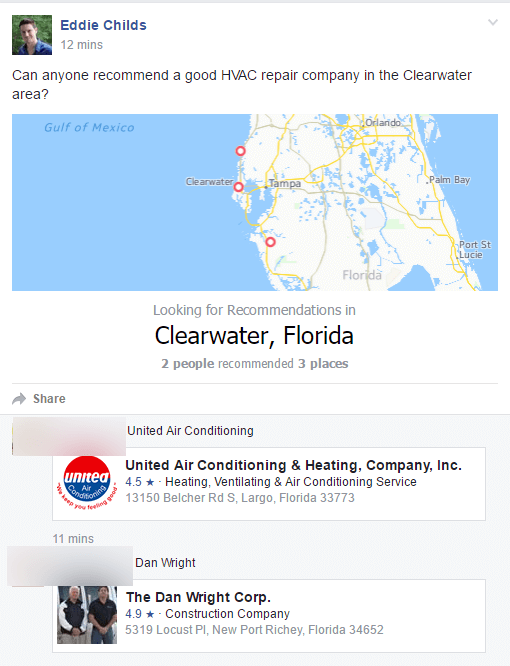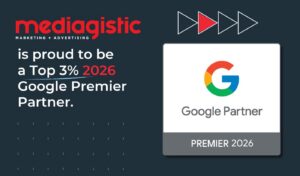
Facebook’s New Recommendations Feature is a Game-Changer for Local Marketing
Yesterday, I was surfing around in my social media feeds, engaged in my normal end-of-day routine of checking in with friends and liking random cat photos. And lo and behold, I suddenly came across a brand-new feature on Facebook. Right away, I recognized that it’s going to be very important for local businesses.
It’s called “Facebook recommendations,” and it’s clearly going to be a game-changer for localized social media marketing. The LeadBuilderⓇ social media team immediately started doing some testing, and we prepared a short guide to Facebook recommendations. Read on to learn more about how this new feature works and what it ultimately means for your local marketing efforts.
How Facebook Recommendations Work
This new feature allows users to solicit recommendations from their Facebook friends via a “personalized map” (Facebook’s term) that appears on the user’s wall and in friends’ newsfeeds. This personalized map recognizes business names as users input them, and it automatically will generate details including addresses, photos, reviews, and links to social media properties.
To enable this feature, the user needs only to post a comment like “can anyone recommend […],” and Facebook will ask the user if he or she wants to activate recommendations. It also asks the user to specify the area in which they need recommendations. This presumably means that users don’t have to physically be in the area when they ask for recommendations. So you can ask your friends for dining recommendations before going on a trip to Chicago, for example.

The post goes up onto the user’s wall, and it appears in their friends’ newsfeeds. Friends then can make recommendations for their favorite businesses in that area, and select the “make recommendation” button below the post. Our testing also has confirmed that, even if this button isn’t clicked, Facebook will automatically pull details from the company’s Facebook page and create a preview below the comment.
In some cases where there are multiple businesses with similar names, it appears that Facebook will allow users to select the correct business from a dropdown list (it looks similar to the “tagging” mechanic that users already use to tag friends and businesses). You can see the recommender’s user experience in the video below, as demonstrated with the help of LeadBuilderⓇ Local Search Strategist Krystina Lisi:
The final result is a map that is highly visible to both the original user (who solicited the recommendation), and to his or her friends. The user can then click through to the various Facebook business pages and continue researching options based on friends’ recommendations. Here’s an example that I created on my own Facebook wall:

The final map shows how many people made recommendations, and by mousing over the “places” part of the listing, it shows a quick list of what those recommendations were. The recommended companies also are visible in the comments below the map.
The Era of Crowd-sourced Social Search
It’s been pretty evident for a while now that Facebook considers Google to be its primary competitor, both for ad dollars and for the mental bandwidth of their users. Just this year, we’ve seen moves by Google to introduce social media-style content into search results (we’re also actively testing the Beta version of this feature with some clients). Likewise, Facebook has made moves to evolve into a local business directory to directly compete with heavy hitters like Google My Business and Yelp.
But the disparity between the two platforms has always been in user intent. Think of how you interact with a Google search versus how you interact with Facebook. When you’re searching in Google, your mind is in a very different place in terms of readiness to purchase. You’re actively looking for something, a term that marketers call “search intent.” By contrast, you’re likely in a more passive mindset when consuming content in your Facebook feed.
This new feature arguably bridges the “intent gap.” It bypasses Google search recommendations and uses a crowd-sourced approach to content discovery. This means that it’s entirely possible for users to actively search for local businesses and find exactly what they need without ever having to step a foot outside of Facebook.
Perhaps even more significantly, it combines this search intent with direct verification from trusted friends and family — recommendations that are trusted more than 80 percent of the time, according to Nielsen. Time will tell, but if I were a betting man, I’d lay money on it. The era of crowd-sourced social search has officially begun.
Take Advantage of Facebook Recommendations
There’s a long-standing joke among social media marketers and tech commentators that Mark Zuckerberg wants to move the entire Internet into Facebook. Assuming this feature proves to be popular and it achieves a high level of user adoption, Zuckerberg might finally get his wish.
Subsequently, having an active Facebook fan page is going to become increasingly important in the coming weeks and months. As more users turn to Facebook’s crowd-sourced search solutions for purposes of discovery and verification, your business’ social presence needs to be optimized and firing on all cylinders.
Here are some things to consider if you’re looking to take advantage of Facebook Recommendations:
- Encouraging Top-of-Mind Awareness: Generating top-of-mind awareness among Facebook users is now more important than ever. If you can manage to catch users precisely at that crucial “micro moment” right before a friend has asked for a recommendation, your business is more likely to be on the receiving end of a referral. That sounds like a tall order, but you can accomplish this through a strategic combination of paid advertising and organic post content.
- Creating Engaging Post Content: Needless to say, if users regularly enjoy and engage with your brand’s content, they’re much more likely to mention your business when they’re asked to make a recommendation. Maintain a presence in your fans’ newsfeeds without being intrusive. Strive to create visually interesting, clever content that stands apart from the noise. If you can encourage a genuine engagement — either through organic or promoted (“boosted”) posts — that recommendation is only a few keystrokes away.
- Setting Up Multiple Locations: Facebook populates the details for recommendations using the address and other data supplied to it through your fan page. If you only have one location set up in Facebook, then the recommendations are probably going to contain inaccurate information. Considering the recommendations are arranged on a visual map and the map revolves around your location’s proximity to the user, this can mean the difference when it comes to winning a recommendation. As a result, it’s important to make sure your page is set up according to Facebook’s locations guidelines and best practices.
- Managing Reviews and Complaints: Clicking through to your Facebook page will be the very first thing that users will do upon receiving recommendations from their friends. The last thing you want is a page full of bad reviews and unanswered complaints. Your page needs to be managed and monitored, and you want it to present a professional image to potential customers who have been referred to your page.
At this point, I offer a word of caution to all the would-be the overachievers out there. This is a lot more work than it might first seem. My team here at Mediagistic includes a number of full-time social specialists whose sole jobs are to manage our clients’ social media accounts. Rest assured that these activities require dedicated support and monitoring if you want them done consistently and correctly.
Social Media Solutions for Local Businesses
This entire blog boils down to one point: Traditional search behavior is becoming ever more fragmented, and it’s being driven by innovations like this new Facebook recommendations feature. Five years ago, local businesses could stay competitive if they just invested in a solid website and a little SEO.
Doing so could capture a pretty large share of search volume, and it really didn’t take much more to get found through search. But user behavior is changing, and social media is rapidly becoming a more viable search channel. In another five years, it could be a direct competitor to traditional search in terms of how users interact with the Web.
Like many SMBs, you may be struggling with finding the time and expertise to manage your social media marketing. If this is the case, then LeadBuilderⓇ has fully managed and comprehensive social media solutions available for small and medium sized local businesses. These services are turnkey and holistic, meaning you can get back to running your business and rest easy knowing your social media presence is in professional hands.
 Eddie Childs is the Inbound Marketing Manager for LeadBuilder®. His writing has been published by a range of websites and publications including Copypress.com, Jambase.com, NFLSoup.com, FootballNation.com, and Boating World, KnowAtlanta, Men’s Book, Cobb in Focus, TCL, Blush, Charged Electric Vehicles, Business to Business, and Catalyst magazines. Follow him on Twitter and connect with him on Linkedin.
Eddie Childs is the Inbound Marketing Manager for LeadBuilder®. His writing has been published by a range of websites and publications including Copypress.com, Jambase.com, NFLSoup.com, FootballNation.com, and Boating World, KnowAtlanta, Men’s Book, Cobb in Focus, TCL, Blush, Charged Electric Vehicles, Business to Business, and Catalyst magazines. Follow him on Twitter and connect with him on Linkedin.
Image via Thinkstock
You May Also Like

Mediagistic Earns 2026 Google Premier Partner Status, Ranking Among the Top 3% of Agencies Nationwide
February 24, 2026Mediagistic is proud to announce that we have once again earned Google Premier Partner status for 2026. This distinction places us among… Continue Reading Mediagistic Earns 2026 Google Premier Partner Status, Ranking Among the Top 3% of Agencies Nationwide…

EPIC 2026 Recap: What Getting 1% Better Means for HVAC Marketing in 2026
February 19, 2026The Main Event of HVAC delivered exactly what the industry needed. At EGIA’s EPIC 2026, contractors, distributors, and partners from across the… Continue Reading EPIC 2026 Recap: What Getting 1% Better Means for HVAC Marketing in 2026…

HVAC Marketing in 2026: Industry Data, Trends & Growth Benchmarks for Contractors [Infographic]
February 1, 2026HVAC is picking up again in 2026, but competition is getting tougher. Costs are rising, and more companies are fighting for the… Continue Reading HVAC Marketing in 2026: Industry Data, Trends & Growth Benchmarks for Contractors [Infographic]…